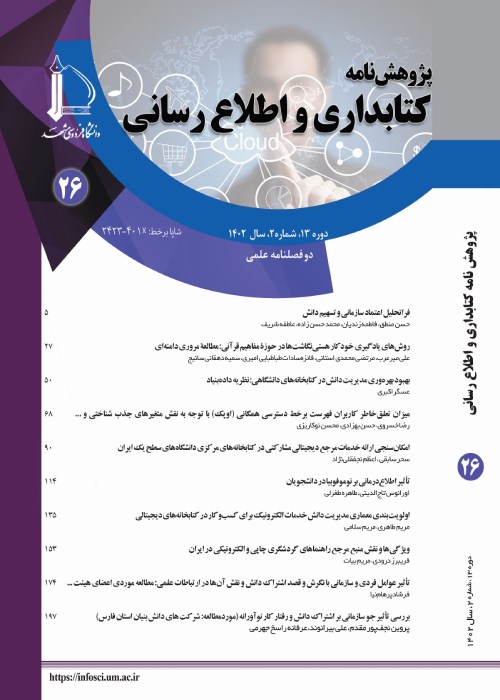Examination of Effective Deterrent Factors in the Implementation of Knowledge Management Systems in Knowledge-Based Organizations (A case study of the Organization of Libraries, Museums, and the Documentation Centre of Astan Quds Razavi)
Knowledge as a fundamental factor of competition and innovation tool in the modern economic world and the scientist has become a valuable commodity and needs proper management. Identifying the factors and obstacles for the implementation of knowledge management system and the lack of formation and implementation of knowledge management systems is one of the basic principles and prerequisites for implementing the knowledge management system in a set.
The present study is exploratory in terms of purpose. Also, this research has been done using an interpretive approach and a qualitative method of case study. The population of the present study includes all the employees of The Organization of Libraries, Museums Center of Astan Quds Razavi, which are a total of 350 people. Targeted snowball sampling was performed among experts familiar with the field of knowledge management who have previously conducted research in this regard. The number of sample people according to the theoretical saturation of the data was 7 employees. In this study, in-depth and semi-structured interviews were used to collect data. Thematic or team-based analysis was performed to analyze the data using MAXQDA version 10 qualitative data analysis software.
After analyzing the data and coding several stages of interviews conducted by several researchers to achieve the best topics, the reasons for the lack of knowledge management system in The Organization of Libraries, Museums Center of Astan Quds Razavi in three main categories: organizational factors, human factors and technical factors were categorized. The results of the interviewees showed that two central factors have not formed the knowledge management system in the organization that the other factors have originated from these two factors, which are: (organizational factor) and (human factor).
The results of the interviewees' opinion show that the organizational factor and then the human factor have the highest frequency in terms of influencing the process of implementing the knowledge management system. It has also had less technical factor in between. "Lack of need for feeling" as a subset of the first factor (organization) was more important than all the cases according to the opinions of experts and all the interviewees emphasized on it. According to the interviewees, although the technology infrastructure is not the entire knowledge management system, it is an integral part of it. In their view, traditional knowledge cannot be used to manage growing knowledge, and new tools and technological infrastructures, including hardware and software, must be used. To reach the stage of applying knowledge, serious changes in attitudes and policies are needed, which can be achieved by training employees and managers. The role of consultants and specialists, who are the scientific and professional body of the organization, is very important for advising, justifying and convincing managers.
- حق عضویت دریافتی صرف حمایت از نشریات عضو و نگهداری، تکمیل و توسعه مگیران میشود.
- پرداخت حق اشتراک و دانلود مقالات اجازه بازنشر آن در سایر رسانههای چاپی و دیجیتال را به کاربر نمیدهد.



